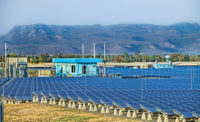Officials Reach Historic Climate Deal

Climate change is causing glaciers to melt at an alarming pace. Pictured, a melting glacier in Kenai Fjords National Park in Alaska. White House Photo/Peter Souza
For the first time in history, world leaders and negotiators from 187 countries have reached an agreement to do their part in reducing emissions to avoid the worst effects of climate change.
Meeting at the Conference of Parties (COP-21) to the United Nations Framework Convention on Climate Change in Paris Nov. 30-Dec.12, world leaders and negotiators reached an agreement on Dec. 12 that is tougher than observers had initially anticipated, or even hoped. It seeks to hold the global temperature increase due to climate change to 1.5° C, more ambitious than the 2 ° C increase environmental advocates had hoped for. Scientists have said that the global temperature must not increase more than 2° C in order for the worst effects of climate change to be avoided.
World leaders including President Obama, French President Francois Holland, Chinese President Xi JinPing and Russian President Vladimir Putin attended the opening of the climate talks in Paris Nov. 30. Construction and building groups have watched the negotiations carefully, because, they say, decisions made in Paris could have far-reaching ramifications—from energy-efficiency requirements for buildings to the types of projects that are constructed at all.
In a statement shortly after the agreement was reached, President Obama said, "This agreement sends a powerful signal that the world is firmly committed to a low-carbon future. And that has the potential to unleash investment and innovation in clean energy at a scale we have never seen before." He added, "This agreement represents the best chance we've had to save the one planet that we've got."
President Obama has pledged to cut carbon pollution and other U.S. greenhouse gases between 26% and 28% by 2025, compared to 2005 levels. China, the world's largest polluter, has pledged to cap its carbon emissions by 2030, through more investment in renewable energy sources and a cap and trade system to be implemented by 2017. And India, another large polluter, has pledged to reduce the amount of carbon it emits as a share of economic output, by about one-third by 2030.
The Natural Resources Defense Council (NRDC) says that the pledges made to date are still not aggressive enough to hold temperatures increases to 2° C, but notes that the agreement calls for nations to assess progress every two years and reconvene every five to set even more aggressive goals.
Although the environmental groups like the NRDC cheered the agreement, Republicans in Congress have vowed to fight the centerpiece of Obama's plan to reduce emissions in the United States, the Clean Power Plan. The Republican-led Congress has approved multiple resolutions disapproving the president’s Clean Power program, which would require reductions in emissions at existing coal- and other fossil-fuel-burning plants. The GOP is unlikely to support any proposal to cut fossil-fuel production, and several lawsuits are pending to challenge Obama's plan.
Nevertheless, there appears to be growing support from the business community to cut greenhouse gas emissions. For example, 20 countries and more than 60 organizations on Dec. 3 launched the Global Alliance for Buildings and Construction to speed up and expand the building sector’s potential to trim emissions. The groups include the Royal Institution of Chartered Surveyors (RICS), World Green Building Council and International Union of Architects.
Alliance co-founder Ibrahim Thiaw, United Nations Environment Program deputy executive director, said at the conference that buildings account for 30% of global CO2 emissions. He added, “What will be done in this sector is crucial for the future of developing countries”
The alliance's goals include: minimizing energy demand; using products and practices throughout the construction process and implementing integrated building design and urban planning. A RICS Americas spokesman told ENR that RICS is collaborating with the National Institute of Building Sciences (NIBS) to explore how public-private partnerships could help promote construction of high-performing public buildings to reduce their carbon emissions.
On Nov. 30, Obama, Hollande and other leaders announced a major research and development initiative called “Mission Innovation” to spur new ideas in clean energy. Twenty-one countries, including the U.S., U.K., France, Canada, Brazil and Australia, agreed to double investments in (R&D) projects that can advance and accelerate the clean-energy technology development, according to the White House. The projects would be designed and managed to attract private investors who hope to commercialize the technology. Another announced new program is the Breakthrough Energy Coalition. Spearheaded by multi-billionaire Bill Gates and other private investors, the group aims to help promising early stage companies to scale up quickly to the size needed for commercial energy generation.




